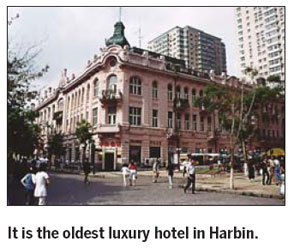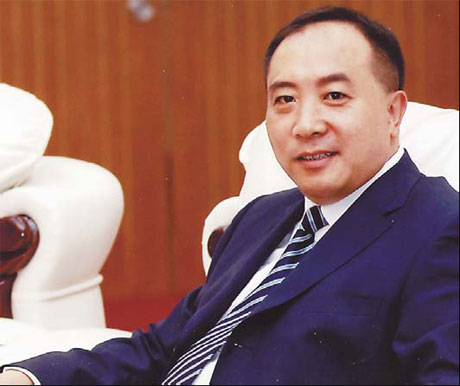Modern Hotel is jewel in city's crown
|
Liu Ruiqiang has big plans for Modern Hotel. Photos provided to China Daily |
Hotel profile | Harbin
The Harbin icon dates back to 1906 and clearly has a bright future ahead. Raymond Zhou and Tian Xuefei report.
Liu Ruiqiang knows he has a gem on his hands. His problem is how to restore its luster so that more people will become aware of its value.
The "gem" in question is Modern Hotel, and Liu is its general manager.
If you ask for directions in Harbin, Heilongjiang province, you should say Madieer Hotel because people here know it by its Russian name (madieer is Russian for "modern"). It is the oldest luxury hotel in the city, but not everyone knows its storied past.
A walk through its lobby will educate you. It is not grand, like most modern luxury hotels, but is full of great details. There is a corridor that resembles a museum gallery, with a row of old photos on one side and exhibits on the other. The photos are of the hotel's founder and some of its many illustrious guests.
I.A. Caspe, who built the hotel in 1906, was one of 20,000 Jews who migrated from Europe and Russia, to this booming city in Northeastern China in the early 20th century, after the opening of the Chinese Eastern Railway in 1901. It was designed in the then popular Art Nouveau style.
The hotel attracted hordes of celebrities, from Russian ballet dancers to Peking Opera stars, diplomats and journalists. Some called it a "miniature Versailles". Today, the 160-room hotel is shining again after six name changes and numerous renovations.
If things work out as Liu Ruiqiang has planned, Modern Hotel will go through another major renovation at a cost of 100 million yuan ($15.39 million) and have a Jewish management team at its helm. Liu, who visited Israel in 2008, says: "There is so much we can learn from them."
"In three to five years, the number of in-coming tourists to Harbin will double," Liu adds. "Harbin has numerous wonders to show the world."
To regain its international stature, Liu has hired two foreign bands, one Russian and one Philippine, to play on its balcony facing Central Street. This has been going on for three years and makes the spot in front of the hotel a lively place to be every day for two hours.
Liu, 51, has spent half his life in hotel management. He became the 25th manager in the hotel's history when he was given the job in 2006. The company, which includes not only the hotel, but also tourism, real estate and food production companies, was mired in debt and needed a way out.

Liu had worked in almost every position in the company and knew what was wrong. Yet, it took him great courage and stamina to set it right. Within one year, he laid down 50 rules that pushed the company onto the road of recovery.
Liu is acutely aware of the mission of preserving the heritage of this grand dame of the city's hotels. Under his helm, many historic items connected to the hotel were collected. The lobby was returned to its original style and opened to the public, for free. A restaurant serving Western-style cuisine has become a favorite hangout for both locals and out-of-town visitors. Rooms named after dignitaries who once stayed have added a lustrous icing to what used to be standard four-star amenities.
Liu is building a business empire. From the core business of the hotel, he has expanded to include a fleet of taxis, a hunting ground, and a line of food and management services. If the hotel is the crown on the edifice that is Modern Group, of which he is the chairman of the board as well as CEO, the ice and snow festival and the beer festival, both held annually, are the twin pillars.
Liu is especially proud of the ice and snow show, which the municipal government started in 1999 and has been exclusively funded and managed by Modern Group since 2001.
"Even though ours is already the world's largest in scale, we cannot stop innovating," Liu says. "Every year we come up with a new theme. Last year, we used eco-friendly lighting that cut energy consumption by half."
Liu has grand plans in store. He wants to build an all-season playground and an all-French town.
Listening to Liu talk about the details of his vision, one realizes that the past and the future are linked.
Respect for the city's history is a cornerstone of his ability to innovate and visualize a brave new world.
(China Daily 07/16/2011 page13)



















